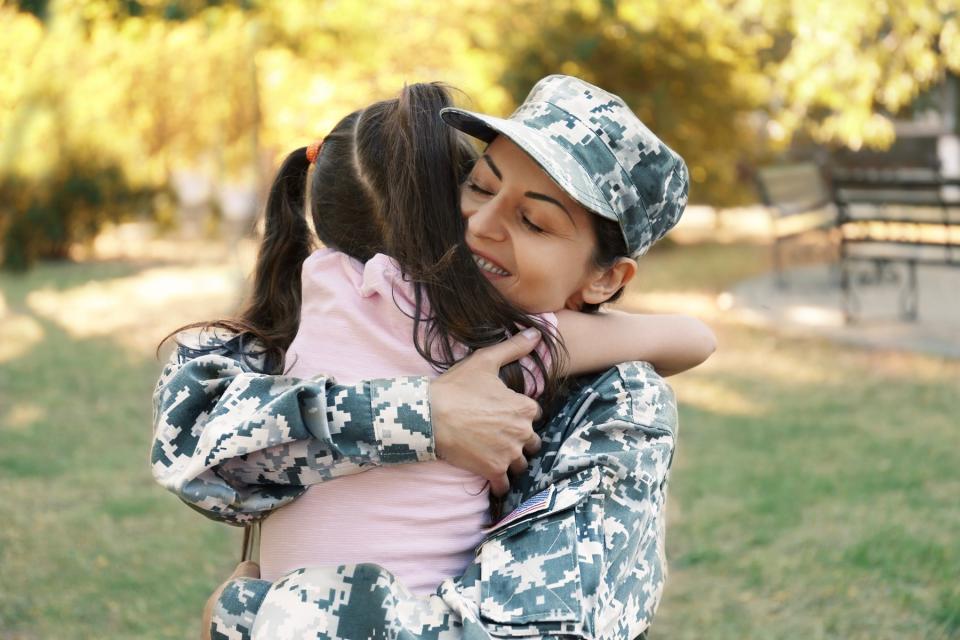Six Tips for Helping Children Cope With Army Deployments

 When a parent serves in the Army, their whole family is impacted by their service. Deployments and relocations present unique challenges that are faced each day by Army families. For some, these challenges can take an enormous toll on the family dynamic. Moreover, Army families who face a divorce may find that their situation becomes even more challenging. One parent's absence due to a deployment plus the emotional weight of the divorce at home can be hard to navigate, particularly for children.
When a parent serves in the Army, their whole family is impacted by their service. Deployments and relocations present unique challenges that are faced each day by Army families. For some, these challenges can take an enormous toll on the family dynamic. Moreover, Army families who face a divorce may find that their situation becomes even more challenging. One parent's absence due to a deployment plus the emotional weight of the divorce at home can be hard to navigate, particularly for children.
Whether parents are divorced or not, it is important that both parents work to support their child as their whole family moves through a difficult deployment. Here are six ways that parents can help their children cope with Army deployments.
- Be honest. Your child may have plenty of questions for you about why the deployment is happening and why their parent needs to go. Give your child as much information as you can in terms that they will understand. Stay as positive as possible, and try not to distress your child more than they already are.
- Tell your child about where you are going. As the parent being deployed, help your child understand where you'll be by teaching them a bit about it. Pull out a map and show them where you will be staying. Tell them a bit about what your daily life will be like there including what you'll be eating, what the weather will be like, and what the culture is like in this place.
- Encourage your child to talk about the parent who is deployed. As the parent who was not deployed, talk to your child about the parent who is away. Whether you are still together or divorced, it will help your child to know that they can speak openly about their absent parent. Remind your child that even though their other parent is away, that parent still cares deeply and often thinks about them. Encourage your child to share their feelings with you, and always do your best to comfort and reassure them if they express any worries to you.
- Have a communication plan in place. Numerous factors may affect how often a parent serving in the Army will be able to communicate with their children during a deployment such as their work schedule, a difference in time zones, and access to communication technology. Video chats are a great way to connect face-to-face when you are able to, but this might not always work if your schedules don't align just right. For those times that you cannot communicate at the same time, sending messages and sharing photos or videos through a secure online communication tool will allow you to stay connected.
- If divorced, let your child know it was not their fault. It can be hard for a child to understand why their parents are getting divorced. They may even begin to believe that they, in some way, caused it to happen. Again, both parents should continually reassure their child that the divorce was not their fault. Even if you think that your child already knows this, it's important to say it many times to reinforce this fact for your child.
- Talk to the other adults in your child's life about what your family is facing. Relatives, teachers, doctors, counsellors, and other important adults in your child's life should be made aware of the changes that your family is currently facing. If they know what is going on, they will be more prepared to offer your child the support that they need.
Helping children cope with Army deployments is key to maintaining their health throughout this emotional time. If you notice that your child continually struggling to cope with your family's current situation, talk to a professional who specialises in helping Army families and children cope with family transitions.
Spotlight: Parents Here and There: A Kid's Guide to Deployment
Parents Here and There is a book focused on helping young children cope with the emotions of being separated from a parent due to deployment. It's an excellent resource for helping kids understand that it's okay to miss their parent who is away but that there are many things they can do at home to remember and celebrate their mom or dad and the great service they are providing to our country.